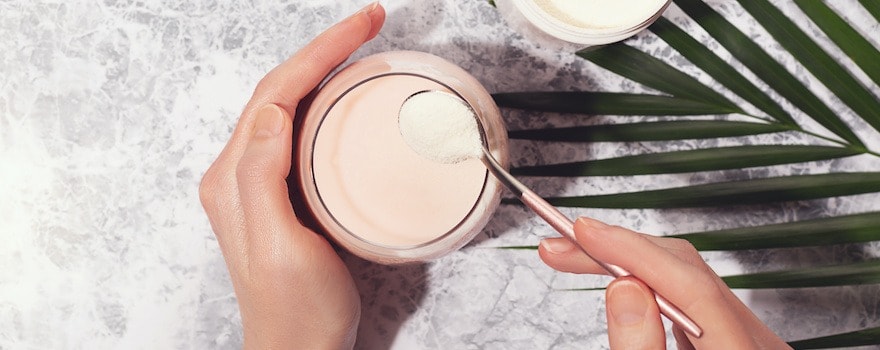What is collagen?
Collagen is a structural protein made up of a chain of amino acids. Its main role is to ensure the maintenance and cohesion of tissues.
That is why it is nicknamed the “cement of the body”. It is naturally found in bones, cartilage, muscles, tendons, and the skin.
Indeed, in addition to composing the body’s structure, it provides suppleness and elasticity to the skin.
Located in the dermis (inner layer), type 1 collagen is also essential for hydration, tissue regeneration, and wound healing.
The type 2 collagen is found in the joints, but that’s not the one we’re focusing on in this article.
Also read | Everything you need to know before buying collagen
Unfortunately, its production decreases over the years. The skin loses firmness, sags, and signs of aging become more visible. Consuming collagen-rich foods or taking dietary supplements may therefore be necessary to compensate for this loss.

Its benefits for the skin
It provides suppleness, firmness, and elasticity
Collagen is made up of fibers and strands that bind and stack on top of each other. Very elastic and strong, this network forms the skin’s structure. It provides the skin with suppleness, firmness, tone, and elasticity.
Key ingredient in cosmetic and anti-aging products, it is well known for firming and redefining the facial contour, plumping the skin and filling in wrinkles.
As shown by this study, oral supplementation can also reduce wrinkles and slow the natural process of skin aging.
It maintains hydration
It also plays a major role in skin hydration. On the one hand, its fibers have the ability to attract and retain water in the tissues. On the other hand, it forms a film on the surface of the epidermis.
This film slows the evaporation of water contained in the layers of the epidermis, a process called « Insensible Water Loss » (PIE). Thus, collagen prevents dehydration and skin dryness.
In this study, collagen supplementation significantly improved skin hydration as well as its elasticity and density.

It protects the skin
Collagen supports and strengthens the protective barrier, the skin’s natural « shield ». Thus, it protects against pathogens (bacteria, viruses, fungi…) as well as external aggressions (cold, wind, pollution…).
This protective effect is multiplied when collagen is combined with vitamin C (in dietary supplements or in cosmetics). Indeed, vitamin C stimulates its synthesis, as highlighted by this article.
Additionally, it protects the skin from free radicals that accelerate skin aging.
It promotes wound healing
Collagen is involved in the wound healing process (injuries, burns…). Indeed, it promotes regeneration and tissue remodeling. During healing, collagen production is locally activated.
In this study, researchers discovered that collagen fibers reform structures on their own.
Furthermore, collagen can regulate and/or block the activity of matrix metalloproteinases (MMPs). These enzymes can degrade many proteins including collagen and elastin, which are essential for healing.
Also read | The 3 best dietary supplements for the skin according to a pharmacist



